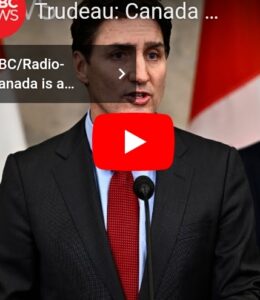Trade War Escalates: Canada, Mexico, and China Respond to Trump’s Tariff Measures
Trade War Escalates: Canada, Mexico, and China Respond to Trump’s Tariff Measures

President Donald Trump took to social media to explain that his latest tariffs were essential to “protect Americans,” emphasizing the need for Canada, Mexico, and China to take stronger action against the production and export of illegal fentanyl. He also called on Canada and Mexico to reduce illegal immigration into the U.S. This move, which fulfilled one of Trump’s campaign promises, has stirred concerns over the global economy and potential disruptions to his political agenda aimed at lowering prices.
The new tariffs come with a mechanism to escalate rates in response to retaliation from the affected countries, threatening even more serious economic consequences.
In his statement, Trump argued that the tariffs were crucial in addressing the fentanyl epidemic, which is the leading cause of death among Americans aged 18 to 45. He emphasized the responsibility of China, Mexico, and Canada in curbing the flow of dangerous drugs into the U.S.
Key details include:
Trump has imposed a 25% tariff on Mexican goods, to be paid by Mexican producers, until Mexico collaborates more effectively with the U.S. in combating drug trafficking.
Mexican cartels, notorious for trafficking fentanyl, meth, and other drugs, are allegedly supported by the Mexican government, which Trump claims jeopardizes U.S. national security and public health.
A 25% tariff will be applied to Canadian goods, alongside a 10% tariff on Canadian energy resources, until Canada takes stronger action against drug traffickers and illegal border crossings.
The U.S. has seized significant amounts of fentanyl at the northern border, enough to potentially kill millions, and illegal border crossings from Canada have reached record levels in recent years.
Trump also implemented a 10% tariff on Chinese goods, demanding full cooperation from the Chinese government in the fight against fentanyl. He accuses China’s Communist Party of subsidizing chemical companies that contribute to the illicit drug trade.
Despite criticism from media sources, Trump’s administration points to studies, including one from 2024, suggesting that the tariffs strengthened the U.S. economy and led to increased reshoring in sectors like manufacturing and steel. Former Treasury Secretary Janet Yellen has also supported the view that tariffs do not harm consumers as some critics claim.
TRENDING SONGS
 Shock in Anambra: Bride Disappears Moments Before Wedding
Shock in Anambra: Bride Disappears Moments Before Wedding
 Nigerian Woman Returns ₦330 Million Accidentally Credited to Her Account
Nigerian Woman Returns ₦330 Million Accidentally Credited to Her Account
 APC Don Reach Morocco?’ VeryDarkMan Reacts to Seyi Tinubu Poster
APC Don Reach Morocco?’ VeryDarkMan Reacts to Seyi Tinubu Poster
 Bride Breaks Down in Tears as Wedding Meals Were Kept Secretly While Guests Go Home Hungry
Bride Breaks Down in Tears as Wedding Meals Were Kept Secretly While Guests Go Home Hungry
 Odogwu by Day, Robber by Night: How Marriage Joy Turned Into Tragedy
Odogwu by Day, Robber by Night: How Marriage Joy Turned Into Tragedy
 Nigerian Officials Allegedly Pocket N4–6B Weekly Through Smuggling Cartels at Seme–Badagry Border
Nigerian Officials Allegedly Pocket N4–6B Weekly Through Smuggling Cartels at Seme–Badagry Border
 Ahmad Yerima: Naval Officer to Face No Sanctions After Clash with Wike – Matawalle
Ahmad Yerima: Naval Officer to Face No Sanctions After Clash with Wike – Matawalle
 Trending Video: Muslim Man Joins Wife in Hallelujah Challenge ‘Dress Like Your Miracle’ Night
Trending Video: Muslim Man Joins Wife in Hallelujah Challenge ‘Dress Like Your Miracle’ Night
 Woman Seeks Advice as Late Brother’s Wife Refuses to Mourn Him Following His Death With Alleged Mistress
Woman Seeks Advice as Late Brother’s Wife Refuses to Mourn Him Following His Death With Alleged Mistress
 Nobody Cares About Fine Girls In The UK, I Miss Nigeria — Nigerian Lady Laments
Nobody Cares About Fine Girls In The UK, I Miss Nigeria — Nigerian Lady Laments
Share this post with your friends on ![]()













